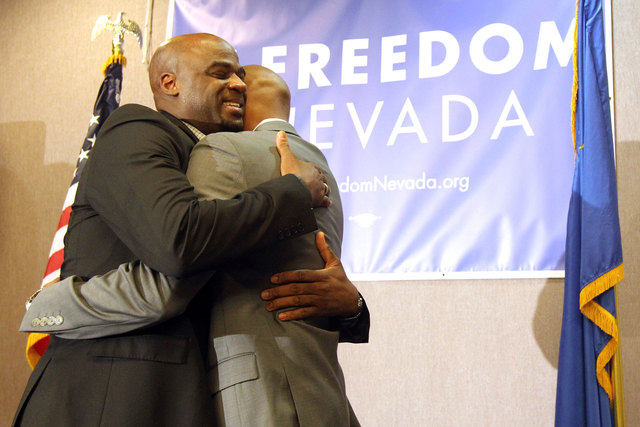Gay marriage foes shouldn’t get another chance
In the confusing hours after the 9th U.S. Circuit Court of Appeals issued its ruling holding Nevada’s same-sex marriage ban unconstitutional, I threw a little Twitter praise toward the Coalition for the Preservation of Marriage, which had filed but then withdrawn a motion for a stay of last week’s ruling.
That was the right thing to do, I said. But it looks like I tweeted too soon and assumed too much.
Instead of surrender, the coalition was merely reorganizing. The fruits of its effort were filed Monday in the form of a motion for the entire 9th Circuit to re-hear the Nevada gay marriage case.
Why? Let’s let the coalition’s lawyer, Monte Stewart, explain.
■ The court got it wrong. The court failed to appreciate the coalition’s argument, Stewart says, with disastrous consequences to come. “Paramount will be the diminution of what the literature calls the child’s bonding right, which flows from the social message, expectation, ideal, and promise that, to the greatest extent possible, a child will know and be raised by her own mother and father, whose union brought her into this world and whose family and biological heritage are central and vital to the child’s identity,” Stewart writes. “Simply and fairly put, the decision distorts, evades and elides the coalition’s defense of man-woman marriage.”
But the court panel didn’t so much as dodge that argument — gays can now marry, so straights will say, “Forget it!” and walk away from family obligations with abandon — as they did laugh it out of the courthouse. And rightly so. While it’s not unusual for litigants to disagree with a court’s ruling, or even to allege that judges gave their points short shrift, that in and of itself is not grounds for granting a motion to re-hear the case before the entire circuit.
■ The court applied the wrong rules. In ruling on Nevada’s case, judges relied on an unrelated 9th Circuit case in which the court essentially said laws that discriminate against gays are subject to a heightened level of scrutiny, even if they were written without a specific intent to discriminate.
“The decision clearly treated [the other case] as something different, as a form of heightened scrutiny without discernible boundaries in that it operates to invalidate any classification with the effect of stigmatizing gays and lesbians. Faithfully applied, the decision thus appears to require the invalidation of every law classifying on the basis of sexual orientation, without any opportunity to justify the classification by reference to the societal interests it advances, an opportunity available even under strict scrutiny.”
Or, put another way, you’re not allowed to pass laws that discriminate against gays and lesbians, mmm’kay, so don’t do it, even if you think you can advance some social good. Because, let’s be honest: Those kinds of laws are usually more about the discrimination than they are about alleged social good.
■ The panel was stacked! Stewart hired a distinguished numbers guy to prove that at least two of the judges on the case — Stephen Reinhardt and Marsha Berzon — were not put on the three-judge panel at random. “Judges Reinhardt and Berzon are publicly perceived to be favorably disposed to arguments for expanding the rights of gay men and lesbians, more so than all or nearly all other judges in this circuit,” Stewart writes. “That perception gives rise to an appearance of an uneven playing field.”
So why did Stewart wait until now to object? If, as he says in his own affidavit supporting his motion, “the Coalition’s counsel became aware of concerns held by other practitioners that the circuit’s judge-assignment process in socially sensitive cases like this one appeared to deviate from the ideal of a random or otherwise neutral process,” why not object sooner? Instead, Stewart went through the entire exercise of arguing before judges he now says he believed were biased and who he alleges were placed on the panel improperly, only to be heard now to complain?
He shouldn’t be allowed another bite at the apple. The coalition’s motion should be denied, and this issue should fully and finally be put to rest.
Steve Sebelius is a Las Vegas Review-Journal political columnist who blogs at SlashPolitics.com. Follow him on Twitter (@SteveSebelius) or reach him at 702-387-5276 or ssebelius@reviewjournal.com.






















